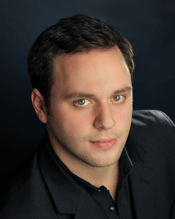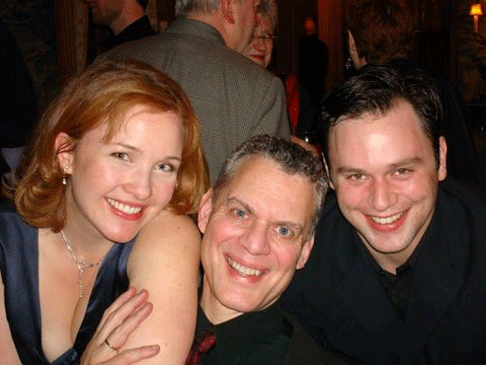29 Oct 2010
New York Festival of Song
“Don’t I have the coolest job in the world?” said Steven Blier.

“Don’t I have the coolest job in the world?” said Steven Blier.
He was talking from the stage about the day mezzo Sasha Cooke walked into his office fresh off the boat from Texas and the day tenor Paul Appleby waltzed in from Indiana. And another hundred people just got off of the train…. If they are terrific singers, I hope they turned to the New York Festival of Song (NYFOS). I can’t imagine why they wouldn’t.
 Paul Appleby [Photo by Ken Howard]
Paul Appleby [Photo by Ken Howard]
The first concert of this year’s series was devoted to youth, and
specialized accordingly in songs not merely about youth but often those
composed by very young composers, composers who went on to bigger things. But
those of us who love early Verdi operas and early Rodgers & Hart musicals
and the Grateful Dead before they were everywhere appreciated the
connoisseurship of reveling in very young Fauré and Schumann and Rorem and
Busoni and Grieg and Ives and Sondheim—and slightly older Gershwin and
Dylan. What themes inspire young composers to give a hint of how worthwhile
they will become? Is it all lindenbäumen and young love’s first
blight? Or is it … anticipation?
I first noticed Sasha Cooke when she sang the Sandman in the Met’s otherwise vocally undistinguished new Hänsel und Gretel, a moment of childlike magical glee, just right for Humperdinck. In a tiny hall like Merkin with its very live acoustic (when a small chorus sings there, you can hear each individual voice), she sounds quite different: Her voice is enormous, plush, lustrous, easily so, and perfectly supported. For most of a song recital, of course, she scales it back to merely very pretty, but whenever she reached an appropriate climax, restraint falls away like a superfluous shawl, and the results are resplendent—intimate, but hugely intimate. As an interpreter, she had the most fun becoming a small child for Ned Rorem’s “A Journey,” the bashful maiden boasting of her first conquest in Grieg’s “Verschwiegene Nachtigall,” where she slipped flawless little ornamental turns into the nightingale’s insinuating “Tandaradei,” the rather more sophisticated maiden of Hugo Wolf’s “Begegnung,” the aching hopefulness of Sondheim’s “Take Me to the World,” and—in duet with Appleby—the breathless expectant wonder and the contrasting, consummated coda of Charles Ives’s delicious “Memories” (“We’re sitting in the opera house”). She is a singing actress to anticipate and a voice to hear one of these days in a place where she can let it fly.
 Sasha Cooke, Steven Blier and Paul Appleby
Sasha Cooke, Steven Blier and Paul Appleby
I haven’t heard Paul Appleby on the opera stage and, frankly, his voice seems (like Cooke’s) too delicious, too full-sized, too able to only be a concert singer, first rate as he is at that subtle skill. He has a smooth, supple delivery and inhabits his narrators: reveling in Schubert’s matchless invention in “Geheimnis” (Schubert was 19 at this point, almost an old master: the song is already D.491) and Vaughan Williams’s “Silent Noon.” Then, in moves and accent and exultant manner, he became with entire believability a Midwestern youth come to take the city by storm in Christopher Berg’s rollercoaster setting of Frank O’Hara’s “I’m Going to New York,” then cocky with adolescent sexual discovery in William Bolcom’s setting of Theodore Roethke’s “I Knew A Woman” and bitter with youthful disillusion in Marc Blitzstein’s “In the Clear.” His voice has power, but he holds it in reserve when portraying character; it comes out in songs like Paul Moravec’s setting of Wordsworth, “My Heart Leaps Up.”
Later concerts this season will be devoted to Songs of Gay Life and Songs of the Iberian Peninsula. Spain has been a NYFOS destination before, but we are unlikely to run low on little-known Iberian song literature anytime soon.
John Yohalem